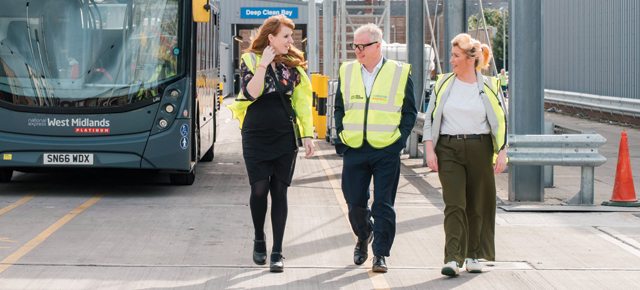Party says that its plan will allow 250 million more bus passenger journeys a year, but ‘it will require no additional central government spending’

Labour has promised to help local authorities to introduce bus franchising “in as little as two years” if it wins power at the next general election.
Labour’s shadow transport secretary, Louise Haigh has set out the party’s plans for a better bus network across England, with a promise to allow every community across the country to take back control of local bus services.
A statement issued by Labour on April 11 declared: “The plan will also see better buses delivered faster, with franchising done in as little as two years. Greater Manchester endured a six-year slog due to unnecessary barriers imposed by central government.”
During its first term, a Labour Government will pass new legislation to support local transport authorities to take back control of their bus services. The party claims that its plan could create and save up to 1,300 vital bus routes and allow 250 million more passenger journeys per year compared to the existing system – but “it will require no additional central government spending”.
Haigh launched the plan at an event in the West Midlands with Labour’s deputy leader, Angela Rayner, and the party’s West Midlands mayoral candidate, Richard Parker. Parker has pledged to introduce bus franchising if he wins the region’s mayoral election on May 2.
Labour will give every community the power to take back control of their bus services, and will support local leaders to deliver better buses, faster
Haigh commented: “Labour will give every community the power to take back control of their bus services, and will support local leaders to deliver better buses, faster.”
Where bus franchising is already in place, in London and Greater Manchester, Labour claims that buses have thrived. In Greater Manchester, the Bee Network, introduced under Labour mayor Andy Burnham, has “improved reliability and significantly grown passenger numbers less than a year after bus franchising went live”.
Haigh said: “Reliable, affordable and regular buses are the difference between opportunity and isolation for millions of people across the country.
“Four decades of disastrous deregulation of Britain’s buses has robbed communities of a say over the vital services that they depend on, instead handing power to unaccountable private operators who have slashed services.”
Labour’s new five-point plan for buses in England also promises to bring “an end to the postcode lottery of bus services by providing safeguards over local networks across the country”.
CPT and its members are committed to working with local leaders whatever the regulatory model any future government may bring forward for the sector
Responding to Labour’s plan, Confederation of Passenger Transport CEO Graham Vidler said: “CPT and its members are committed to working with local leaders whatever the regulatory model any future government may bring forward for the sector. Operators in Greater Manchester, for example, are working flat out in cooperation with the mayor to ensure successful delivery of the new Bee Network.
“Local leaders already have extensive opportunities to influence and shape delivery of bus services through the contractual arrangements available under ‘enhanced partnerships’. Local authorities and operators in places like Leicester, Portsmouth and Norfolk are already demonstrating the extent to which real improvements in the passenger experience can be delivered without further regulatory reform.
“Whatever the regulatory approach, we know that passengers want more bus services going to more places that are also more reliable and more swift. Better buses will require a stronger focus and sustained investment in these passenger priorities.”
LABOUR’S FIVE POINT BUS PLAN
- 1. Empower local transport authorities and reform funding: by giving local leaders more control and flexibility over bus funding and allowing them to plan ahead to deliver their local transport priorities.
- 2. Allow every community to take back control of their buses: by removing barriers that limit bus franchising powers to metro mayors.
- 3. Accelerate the bus franchising process: by supporting local leaders to deliver better buses, faster.
- 4. Step in to safeguard local bus networks: by providing more accountability over bus operators and ensuring standards are raised across the country.
- 5. Support public ownership: by removing the “ideological ban” on publicly-owned bus companies.
This article appears in the latest issue of Passenger Transport.
DON’T MISS OUT – GET YOUR COPY! – click here to subscribe!








